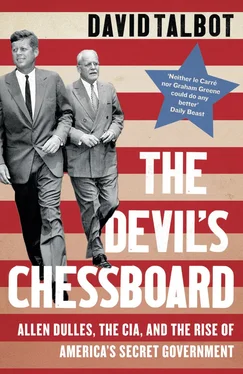Gowen might have been Angleton’s social superior, with much better connections to the Roosevelt and Truman administrations, but in the end it was Angleton who prevailed in the spy games. In May 1947, after Dollmann had spent several bleak months in prison in Rome, Angleton succeeded in outwitting Pagnotta and Gowen and getting the former SS colonel transferred to a U.S. military prison in Frankfurt, where he was safe from the wrath of Italian political enemies and prosecutors. The clever Angleton had Dollmann smuggled out of his Roman cell on a stretcher. In Germany, Dollmann was soon switched to even more agreeable accommodations: a cozy guesthouse in the lush Main countryside that he shared with other former Nazi VIPs, such as the notorious propagandist “Axis Sally,” and Otto Skorzeny, the scar-faced Waffen-SS colonel who was famous for a daring glider raid that rescued Mussolini from mountaintop captivity. By November, after the U.S. military released him from incarceration, Dollmann was a completely free man.
There was sharp disagreement over suspected war criminals like Dollmann within the U.S. military command overseeing the occupation of Germany. General George Price Hays, a decorated officer who led the 10th Mountain Division’s assault on Monte Cassino during the Allies’ Italian campaign and commanded the 2nd Infantry Division’s artillery on Omaha Beach during D-day, was angered by the kid-glove treatment given Dulles’s Sunrise Nazis. Hays, who became high commissioner for the U.S. occupation zone in Germany, tartly pointed out in a November 1947 memo that it was the U.S. Army that was responsible for the surrender of Nazi troops in Italy, not Dulles’s secret maneuvers. Hays was adamantly opposed to granting amnesty to “possible war criminals or war profiteers” like Dollmann, which, he observed, would “condone their crimes without proper examination.” Nonetheless, by 1947, many in the American military hierarchy shared the Dulles-Angleton view that fighting Communism was a bigger priority than prosecuting fascist war criminals.
Even after securing Dollmann’s release, Angleton remained nervous about Bill Gowen. The young man knew too much about Angleton’s string-pulling on behalf of Dollmann and the other Nazi fugitives who had been harbored on Via Archimede. Angleton suspected that Gowen’s CIC unit kept extensive files on the ratlines that had allowed Sunrise collaborators like Dollmann and Rauff to escape justice. He was determined to see what was in those files—an interest undoubtedly shared by Angleton’s mentor, Dulles, as well as their allies in the U.S. intelligence complex.
In November 1947, as Dollmann walked free, the U.S. military moved to shut down its Nazi-hunting operation in Rome. That month, Bill Gowen hopped a train for Frankfurt, which was to be his new base of operations. By the time the slow-moving train crawled into the Frankfurt station, it was after midnight. A jeep driven by a hulking soldier with CIC insignia on his uniform was waiting for Gowen, who threw his duffel bag into the vehicle and jumped in.
Frankfurt was still pulverized from the war. One of the few buildings left miraculously untouched by Allied bombing was the massive IG Farben complex, which now served as the headquarters of the Supreme Allied Command. The city’s demolished landscape was illuminated only by scattered pinpoints of light, and the darkness closed in on Gowen and his driver as the jeep pulled away from the train platform.
“I guess you’re tired,” the driver said. “You’ll want to go to a hotel.”
Gowen, exhausted from the long train ride, nodded emphatically. But instead of heading toward a hotel, the soldier drove deeper into the city’s ruins. Now the only light came from the jeep’s headlamps.
“Where are we going?” asked Gowen.
“I just want to show you something,” said the soldier. There was nothing to be seen, only dark piles of rubble.
“I’ve been to Germany before—I just want to go to bed,” Gowen said.
But the jeep kept creeping slowly through the night shadows. Suddenly the driver came to a halt, jumped out, and told Gowen to follow him. Gowen didn’t like his situation. “He was armed and I wasn’t. I was alarmed, and I’m normally not scared.” Gowen cautiously followed the soldier, walking slowly behind him into the gloom. Gowen didn’t know how far they had walked when the soldier abruptly turned around and headed back to the jeep. When they got to the vehicle, Gowen immediately realized that his duffel bag was missing.
“I wasn’t dumb enough to ask him where my bag was,” Gowen recalled years later. “I knew what had happened. I knew what they were looking for.” As it turned out, there were no intelligence files in Gowen’s stolen bag. But the story wasn’t over.
In January 1948, while Gowen was still stationed in Germany with Army intelligence, he received a transatlantic phone call from syndicated columnist Drew Pearson. The influential Washington journalist told Gowen that he was working on a hot scoop and that Gowen was at the center of it. Pearson was going to report that Ferenc Vajta, a fugitive from war crimes charges in Hungary, where he had worked as an anti-Semitic propagandist for the fascist Arrow Cross Party, had slipped into the United States illegally—with the help of young Nazi hunter Bill Gowen. Pearson claimed he had proof: documents that showed Gowen had worked closely with Vajta on various covert missions. As he listened to Pearson, Gowen was so flabbergasted that he didn’t know what to say. Pearson’s exclusive story ran in newspapers across America on January 18 and was amplified further by his coast-to-coast radio broadcast.
There was some truth to Pearson’s report. Gowen did indeed know Vajta from his days in Rome, when he had used the Hungarian as an informer to help track the notorious Croatian fugitive Ante Pavelić, the fascist leader of the Ustaše movement who led a genocidal campaign in the Balkans during the war that was so extreme he had to be restrained by German authorities. With the help of Ferenc Vajta, Gowen had traced Pavelić to a villa atop the Aventine Hill. Pavelić was under the protection of Croatian officials in the Vatican and other fascist sympathizers. From his villa, Pavelić was able to sneak into nearby safe houses through a series of secret passageways that honeycombed the Aventine.
Gowen was perfectly willing to rely on lesser criminals like Vajta to locate much bigger targets like Pavelić. But he had had nothing to do with providing Vajta a special State Department security clearance and slipping him into the United States. That sleight of hand was likely performed by Frank Wisner, a close collaborator of Dulles’s from their days in the OSS who had recently been appointed head of the State Department’s clandestine operations unit, the Office of Policy Coordination.
But it was Gowen who would take the fall for the Vajta escapade. It did not take him long to figure out who was responsible for setting him up. Pearson had been fed the false story by Raymond Rocca, Angleton’s deputy in Rome.
Pearson’s exposé effectively ended Gowen’s budding intelligence career. Gowen never stopped trying to clear his name. At one point, he managed to get an appointment to see Dulles after Dulles became CIA director, but when Gowen showed up at the agency’s headquarters in Washington to plead his case, he was told that the spymaster had been called overseas.
Years after both men returned to America, Angleton continued to keep an eye on Gowen. Back in Washington, where he eventually became the all-powerful chief of CIA counterintelligence, Angleton invited Gowen to lunch at the Army-Navy Club and even to his home in Virginia. “You know, he was a very devious character,” Gowen said, “but he wanted to give me the impression that he was very friendly. He introduced me to his wife, Cicely, and their children, who were very young at the time.” Angleton’s betrayal of Gowen hovered silently in the air. “I never discussed it openly with him, I never trusted Angleton enough to do that.” Both men knew who had won the power struggle in Rome. But they also knew that the secret history they shared had the power to undo Angleton’s grand career and expose the underside of Sunrise.
Читать дальше











